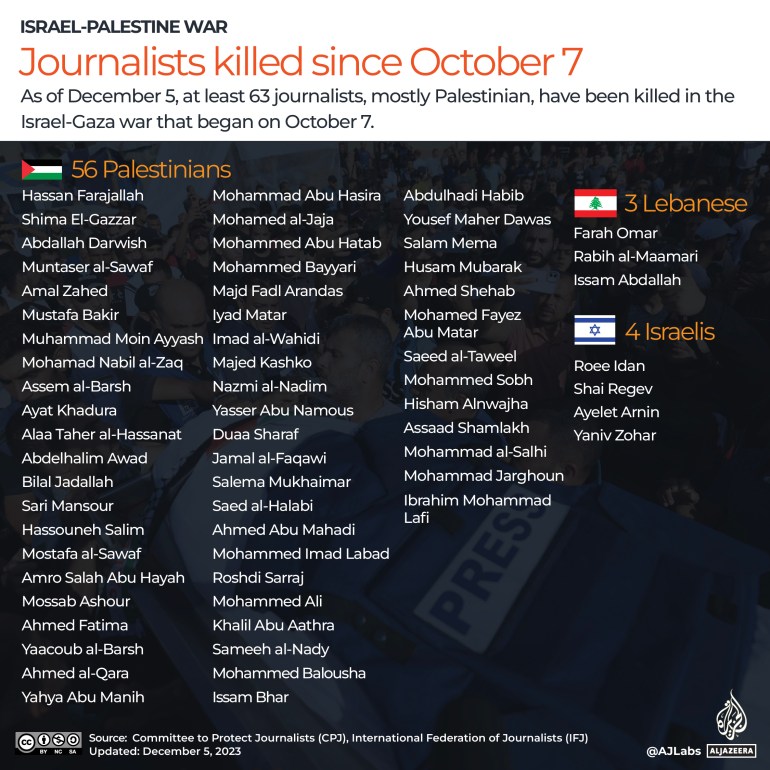Israel should face war crimes probe over journalist death in Lebanon: NGOs
Rights groups say attack that killed Reuters journalist and injured six others ‘likely a direct attack on civilians’.

International rights groups have said that Israeli strikes that killed a journalist and injured six others in southern Lebanon were likely a direct attack on civilians and must be investigated as a war crime.
Separate investigations by Human Rights Watch (HRW) and Amnesty International determined that Israel’s military shot artillery shells at journalists near the border on October 13, in what appeared to be targeted attacks on civilians.
Keep reading
list of 4 itemsReuters, Al Jazeera journalists ‘targeted’ in Lebanon strike: Press group
Two journalists killed by Israeli bombing on Bureij refugee camp
Israeli strike kills three journalists near Lebanon border
The attacks killed Reuters journalist Issam Abdallah and injured six other journalists, including Al Jazeera cameraperson Elie Brakhia and reporter Carmen Joukhadar.
HRW said the “evidence indicates that the Israeli military knew or should have known that the group of people they were firing on were civilians”, making the attack a “war crime”.
“This is an unlawful and apparently deliberate attack on a very visible group of journalists”, HRW’s statement said.
The group also called on Israel’s allies – the United States, the United Kingdom, Canada and Germany – to “suspend military assistance and arms sales to Israel, given the risk they will be used for grave abuses”.
Amnesty, in its own report, said the Israeli military strikes “were likely a direct attack on civilians that must be investigated as a war crime”.
The group’s investigation indicated that the journalists were “well removed from ongoing hostilities, clearly identifiable as members of the media, and had been stationary for at least 75 minutes before they were hit”.
“No journalist should ever be targeted or killed simply for carrying out their work. Israel must not be allowed to kill and attack journalists with impunity,” said Aya Majzoub, Amnesty’s deputy regional director for the Middle East and North Africa.
“Journalists are eyes and ears on the ground, they provide information and evidence that are vital for organisations like ours to see what crimes are being committed,” Majzoub told Al Jazeera.
“It might be the case that the warring parties do not want journalists to be documenting their crimes,” she added.
Journalists covering the Gaza war on the ground are facing unparalleled danger, according to the media rights group Committee to Protect Journalists (CPJ).
Since the Gaza war broke out, at least 63 journalists have been killed, including 56 Palestinians, four Israelis, and three Lebanese nationals, according to the group.
The war has also led to “the deadliest month for journalists” since CPJ began tracking data in 1992.
Over 22 years, CPJ has documented at least 20 journalist killings by the Israeli army. No one has ever been charged or held responsible for these deaths.
The organisation said the impunity in these cases has severely undermined the freedom of the press, leaving journalists vulnerable to attack.
